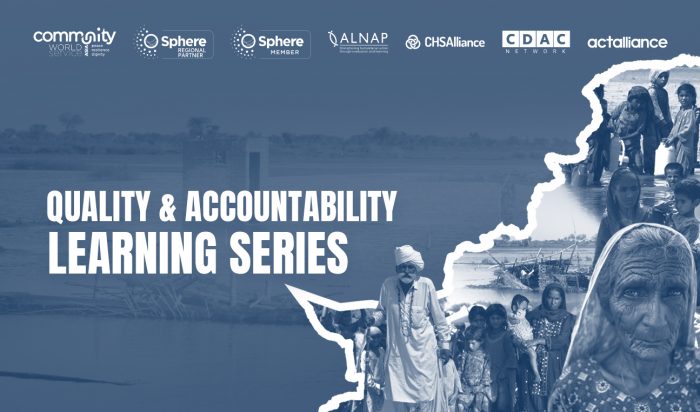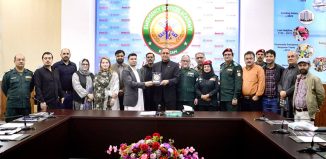Pakistan Flood Response Learning Series: Warranting Quality and Accountability
Community World Service Asia has launched a virtual learning series focusing on promoting quality and accountability (Q&A) and facilitate humanitarian organisations responding to the Pakistan Floods 2022 to discuss challenges, opportunities, and best practices as a group. This provides a platform to engage, interact and learn from each other and ensure a coordinated and principled response, guided by global Q&A standards.
Session 1: Using Core Humanitarian Standard (CHS) in Pakistan Flood Response 2022
The webinar aimed at introducing the CHS guidance in response to the floods, and revisit fundamental principles of CHS which are crucial to a successful, holistic intervention. “In the current flood response, Q&A is not being integrated widely and effectively in checklist for assessment, project design, and monitoring as per CHS/Sphere Standards and indicators to ensure that Q&A is implemented, thus leading to unstandardized aid,” highlighted Rizwan Iqbal, ACT Alliance.
Participants who are working directly with affected communities underlined the challenges that have emerged. Some of these issues include cases and reports of sexual harassment in camps, inadequate facilities for pregnant women, rampant spread of diseases including malaria, sudden cost increase of materials such as tents and mosquito nets, and coordination challenges owing to lack of internet connectivity in affected areas.
“The challenges that have emerged in the flood response cannot be resolved by one organisation on its own. It has curated a need for collaboration, coordination and cooperation among all humanitarian entities working there in addition to advocacy and capacity enhancement on Q&A standards,” emphasised Ayesha Hassan, Community World Service Asia (CWSA).
The second session focused on improving participants’ understanding on the Do No Harm and People-Centred Approaches in the current context and how the Humanitarian Charter, Code of Conduct and an effective Complaint Response Mechanism plays a role in ensuring accountability. Placing people and communities at the centre of all programming was flagged as most crucial to ensuring an accountable humanitarian assistance.
“It is the right time to mainstream the basics of Q&A in Pakistan flood response. Your common sense, knowledge of the context and connection with the community is key. This will build on those lessons, tools, frameworks and policies,” shared Sylvie Robert, Q&A expert and mentor.
Session 3: Applying Quality and Accountability in the Project Cycle to Build Back Better
To overcome the challenges that humanitarian workers face in implementing Q&A approaches, it was recommended that the aid community collaborate and coordinate with each other to improve quality and accountability in a humanitarian response. This session focused on how humanitarian organisations can adapt key Q&A initiatives and their tools to support project cycle management.
Participants shared challenges that they face while applying standards in previous and the current humanitarian response in Pakistan.
- There is a lack of awareness and limited capacity on new and even existing quality and accountability tools and techniques among the aid community and affected communities
- There is always a greater focus on providing quick and timely humanitarian response as opposed to prioritising the quality of the response and accountability to affected people
- There is still mistrust among stakeholders engaged in response at the local and grassroot level that doesn’t welcome standards and tools being imposed from regional and international actors. There is a need for more relationship and trust building among local, national and international responders
- There is a lack of coordination among NGOs and government in some districts key areas such as information sharing and assessments
- Inadequate action on Complaints Response Mechanisms and limited efforts to develop effective and joint CRM for each district to be used by all responding actors
These challenges were discussed and possible solutions were shared among participants. Sylvie Robert reiterated, “Quality and accountability starts from day one and it is not negotiable. There will always be challenges in its implementation but we must stick to these principles. It is a question of attitude and mind-set.”
Participants and speakers collectively agreed that while responding to an emergency could be challenging, integrating Q&A in the project cycle creates an opportunity in emergency response, paving a way for building a better future and prioritising disaster mitigation. An effective complaint and feedback mechanism was highlighted as a key to ensure consistent community engagement and information sharing.







